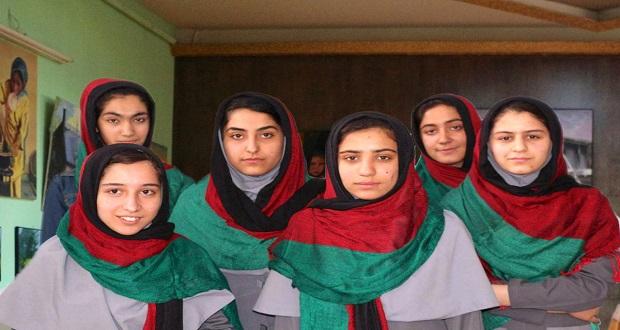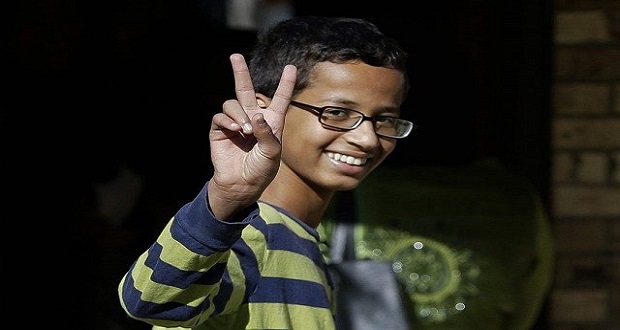It was going to be an exciting month for six girls from Herat, Afghanistan. Chosen from 150 candidates, these teenage girls were set to compete with other teams of young women and men from around the world at an international robotics competition in Washington, DC. They built a robot that can pick up and move a ball, which is part of the FIRST Global Challenge. Unfortunately, the girls will now have to watch their robot compete from afar, via Skype, as they have been denied entry into the United States.
The girls applied for visas twice, and both times they were denied by the U.S. State Department. To date, the girls still have not been given an answer as to why. They had a hard time convincing their families to even let them be a part of the competition and travel to America, and to be denied the opportunity to do so has been devastating and frustrating, to say the least.
On the competition website, a biography for the Afghan girls’ team said: “As a dedicated group of students, mentors, and volunteers, we aim to transform the culture of our community and become some of the young leaders of science and technology.”
Afghanistan is a country in the middle of war, and women are typically not provided with many resources or opportunity. Wazhma Frogh, a women’s rights activist in Afghanistan, says that life continues to get worse for women in Afghanistan. They don’t have a voice, and there has been an increase in violence towards them. As government funding for programs related to women declines, these young women were determined to meet their goals and be an inspiration. One of the robotics team members commented, “We wanted to show the talent of Afghans to the world, to show that we do have skills and should be admired.”
Unless you have been living under a rock, you know that since Donald Trump was sworn into office as President of the United States, he and his team have feverishly been trying to pass a travel ban against majority Muslim countries. After a few setbacks, last week the Trump administration celebrated a small victory – in the latest travel ban order, the Supreme Court allowed the restrictions to go forward for anyone without a close connection to the U.S.
Trump’s order, which was revised from an initial version and signed in March, halts travel for nationals from six predominantly Muslim countries. Afghanistan is not one of them, but ironically, robotics teams from Iran and Sudan—countries named in the order—were given visas to attend the competition. The order is clearly, at the very least, confusing. At worst, as in the case with these Afghan girls, it can be devastating.
When I heard about the all-girls robotics team from Afghanistan, I was elated. With a background in computer science and engineering, I love hearing about young girls who are interested in science, technology, engineering and math (STEM) – a field often stigmatized as a “boys only” field. However, I was disheartened when I heard they were not being allowed to come to the U.S. These girls are living in the midst of war in a country where women are not celebrated, and when they have the opportunity to let their talent shine they are denied that chance.
Apple, Amazon, Expedia, and more Silicon Valley companies have spoken out and taken action against the travel ban since its inception. The tech industry relies on talent and knowledge from countries in India, East Asia, and other regions—including those listed on the executive order.
Chief executive of Hackers/Founders Jonathan Nelson claimed, “People come to Silicon Valley so they can build the American Dream, and this is one of the last places where the American Dream still kind of works.” Yet, that American Dream remains exclusive by other standards, as men outnumber women in the tech industry 7 to 3.
So, what about these girls’ dreams? Even if they aren’t directly contributing to the U.S. economy (besides tourism), are they not worth protecting? They are challenging cultural norms in their home country and in ours—is that not worth celebrating?
“This opportunity would allow us to invent, design, and create things that could possibly allow our community, our lives, and us,” the team members wrote on their page of the FIRST Global Challenge competition website. “We want to make a difference and most breakthroughs in science, technology, and other industries normally start with the dream of a child to do something great. We want to be that child and pursue our dreams to make a difference in people’s lives.”
I do hope these young ladies will continue to pursue their dreams and make a difference – we need more people like them in this world!
UPDATE: NPR reports that the Afghan girls robotics team has been granted entry into the U.S.:
[dropshadowbox align=”none” effect=”lifted-both” width=”auto” height=”” background_color=”#ffffff” border_width=”1″ border_color=”#dddddd” ]It has been an odyssey, but finally, a team of six Afghan girls will be able to travel to the United States to compete in a robotics tournament. Two previous attempts to secure visas – which involved traveling 500 miles to the U.S. Embassy in Kabul – had failed. The U.S. State Department had told the Associated Press that it would not comment on why their visas had been denied, but that that “all visa applications are adjudicated on a case-by-case basis in accordance with U.S. law.” Afghanistan isn’t one of the six countries targeted by President Trump’s travel ban. President Trump intervened to find a way to permit the girls entry, the AP reports. The National Security Council opted to “parole” the girls, a status the U.S. Immigration and Citizenship Services explains requires “an urgent humanitarian reason or significant public benefit.” The girls will be granted one-time entry to the country.[/dropshadowbox]
Good luck girls! We’re glad you made it! Let’s hope that next time it doesn’t take a presidential intervention.



















